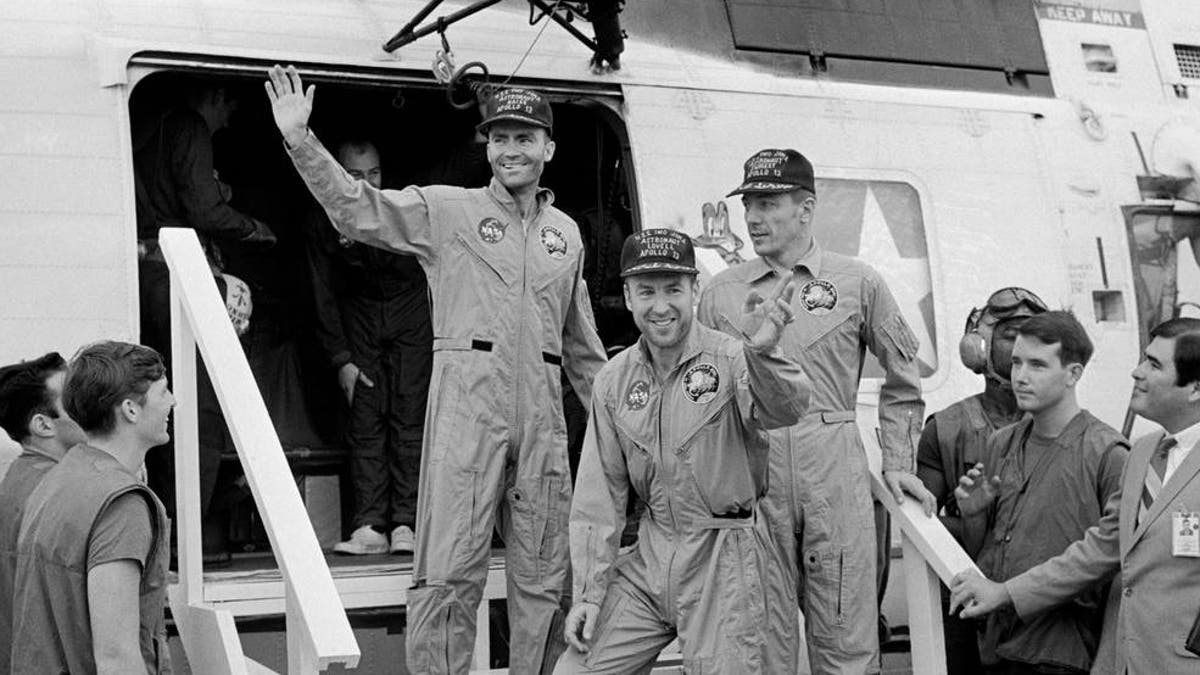Jim Lovell on 50 years since Apollo 13
Astronaut Jim Lovell recounts Apollo 13 launch 50 years later.
Get all the latest news on coronavirus and more delivered daily to your inbox. Sign up here.
One of America's most-beloved astronauts is not finished inspiring the nation -- offering a lesson of American resourcefulness and resolve amid the coronavirus pandemic.
"Whether its a virus or coming back from Apollo 13 -- it's a positive attitude," Apollo 13 commander Jim Lovell told Fox News host, Neil Cavuto, on Saturday. "You have to have a positive attitude that, 'okay, we've got a problem. And how do we solve it."
On April 11, 1970, NASA astronauts Lovell, Fred Haise and Jack Swigert blasted off on a mission to make NASA’s third lunar landing, but their ill-fated flight would make history for another reason.
LIMITED TIME OFFER, GET YOUR FIRST MONTH OF FOX NATION FOR $0.99
Lovell's remarks to Cavuto are reminiscent of one of the most most-iconic phrases in American history.
"OK, Houston, we've had a problem here," said the Apollo 13 crew 50 years ago, just moments after a malfunctioning oxygen tank exploded, crippling their main spacecraft and setting off a seemingly never-ending series of life-threatening challenges.
It was a communication beamed over 200,000 miles from space to mission control in Houston, Texas.
"This is Houston, say again, please," came the reply from Earth.
"Houston, we've had a problem," they repeated.
In Fox Nation's "Return to Earth, The Triumph of Apollo 13," using exclusive interviews and rarely seen NASA footage, Cavuto re-examined the six dramatic days that gripped the world, as American courage and ingenuity transformed near-certain tragedy into one of the space program's greatest triumphs.
On Saturday, Cavuto observed that the ability of the U.S. space program to deal with emergencies like Apollo 13, and even disasters like the 1986 Challenger Explosion, are testaments to a "unique aspect" of America.
APOLLO 13 IMAGE OF NAPPING ASTRONAUT GETS HIGH-DEF TREATMENT FOR 50TH ANNIVERSARY
"I've grown up in this country that you have to think for yourself and if you meet a problem or a challenge then -- can you get over it? And you must think forward," said Lovell. "We had to solve one crisis after the other."
"After we saw that the command module was dying and losing oxygen, electrical power, then we went into that lunar module and tried to see how and where and when we could use it to [inaudible] get back home," recalled Lovell.
Lovell said that he put the disappointment of the aborted lunar landing out of his mind, and focused on the task at hand.
"As we went around the moon, I realized that I was never going to land on the moon, but then of course, when I realized my position and where I was then my concentration and all of my thoughts went back to, 'Hey, how do I get back on the free return course. How much fuel [inaudible] do we have left and how do I get rid of the carbon dioxide..."
"Then, of course, it was getting cold, and we were running out of food, and Fred was getting sick at the time coming down -- and I had to put my arms around him to keep him warm -- but then we kept charging."
"Slowly but surely as we came back -- the thought that we'll actually make it back became more positive," he remembered. "When we first had the explosion, I wasn't too sure where I'd be or whether this would be the end of the crew and the end of the mission."

The Apollo 13 crewmembers step aboard the USS Iwo Jima, prime recovery ship for the mission, following splashdown and recovery operations in the South Pacific Ocean. Exiting the helicopter which made the pick-up some four miles from the Iwo Jima are (from left) astronauts Fred Haise, lunar module pilot; Jim Lovell., commander; and Jack Swigert, command module pilot. (NASA)
There were questions from the U.S. media immediately after the return of Apollo 13 crew over whether America would return to the moon in the near future. But, as Cavuto observed, America did return to space and the moon.
"Because you got home safely and the lessons learned -- we did," said Cavuto. "Jim Lovell, thank you for that lesson. Thank you for all you did. Thank you for getting us to remember a time when we were up against enormous odds and you made the impossible possible."
"I urge you," said Cavuto in a message to viewers about the Fox Nation special "Return to Earth, The Triumph of Apollo 13," "If you really want to go back in time and see what we can do against all odds... in the face of disaster, in the face of very, very long odds, we overcome them."
To watch all of "Return to Earth, The Triumph of Apollo 13," go to Fox Nation and sign up today.
LIMITED TIME OFFER, GET YOUR FIRST MONTH OF FOX NATION FOR $0.99
Fox Nation programs are viewable on-demand and from your mobile device app, but only for Fox Nation subscribers. Go to Fox Nation today to start a free trial and watch the extensive library from Tomi Lahren, Pete Hegseth, Abby Hornacek, Laura Ingraham, Ainsley Earhardt, Greg Gutfeld, Judge Andrew Napolitano and many more of your favorite Fox News personalities.



